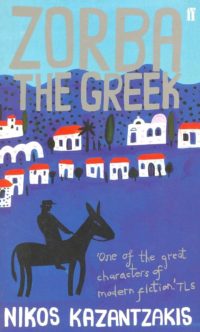All he has is an uncomfortable, dangerous virtue which is hard to satisfy
 Zorba the Greek
Zorba the Greek
by Nikos Kazantzakis
translated from Greek by Carl Wildman
This is my Greece book for the EU Reading Challenge. It was recommended to me by fellow Bristol blogger Joanna Booth. It also counts towards my Classics Club list.
The novel’s narrator (a thinly fictionalised version of the author) is a young scholar who decides to go to a remote part of Crete to try his hand at running a lignite mine. As he’s about to set off from Piraeus he’s approached by a man called Alexis Zorba, a jack-of-all-trades who has some mining experience and offers to be the narrator’s second-in-command. The narrator is immediately entranced by the older man and agrees to all terms, despite all the evidence that suggests Zorba is neither reliable nor loyal. Over the months that follow they become firm friends and help each other to cope with the accidents and tragedies that come their way.
The narrator is clearly a man of some means, throwing himself into his new business and hiring a team of men without really knowing what he’s doing. He has a vague idea that he might stumble across something more valuable than lignite – presumably gems of some kind – but his main purpose is a more politically motivated one. As a socialist, he wants to get to know some working class men. The problem is, he sees all the local villagers as ignorant and foul, and he makes no effort to actually get to know anyone other than Zorba.
“To my mind, this Cretan countryside resembled good prose, carefully ordered, sober, free from supercilious ornament, powerful and restrained. It expressed all that was necessary with the greatest economy. It had no flippancy, nor artifice about it. It said what it had to say with a manly austerity. But between the severe lines one could discern an unexpected sensitiveness and tenderness; in the sheltered hollows the lemon and orange trees perfumed the air, and from the vastness of the sea emanated an inexhaustible poetry.”
I must admit that while the descriptions of Crete, and of the food, are wonderful, I do not understand the narrator’s (and indeed many readers’) perception of Zorba as a romantic hero. Except I guess in the artistic sense of Romantic as craggy, wild and a little frightening. He is not a nice person. Less of a snob than the narrator, I’ll give him, but a horrible misogynist lacking any sense of fidelity or justice. He does and says awful things, and bases his whole life around the pursuit of selfish pleasures, other people be damned.
If it weren’t for the narrator’s hero worship, this wouldn’t be so bad, as Zorba is certainly an interesting character. He has done even more terrible things in his past and does express remorse for this. He makes no pretence of thinking himself to be a good man. He can be a lot of fun, and funny, and throws himself into everything that he does with gusto – for as long as it keeps his attention, that is. The narrator frequently asks Zorba to play his santuri and dance, but Zorba often answers with a mournful “Sorry, boss, but my heart isn’t in it tonight,” which it’s hard not to find endearing.
It’s also worth noting that the narrator frequently refers to another friend of his, Stavridakis, who is Zorba’s opposite. Stavridakis has gone to fight in the Russian Caucasus for the freedom of Greek people living there and tried to persuade the narrator to join him. The narrator expresses deep love and admiration for Stavridakis, a man who is clearly principled and selfless. Both Zorba and Stavridakis affectionately mock the narrator for his bookishness (he reads Dante and philosophy) and his attempts to write a book himself.
“I did not know whether to be angry, or laugh, or just admire this primitive man who simply cracked life’s shell – logic, morality, honesty – and went straight to its very substance. All the little virtues which are so useful are lacking in him. All he has is an uncomfortable, dangerous virtue which is hard to satisfy and which urges him continually and irresistibly towards the utmost limits, towards the abyss.”
But the whole novel, from its structure to the tone in which it is told, is based around how Zorba was the narrator’s biggest influence, a great object of admiration, and I just couldn’t escape from finding that unsettling. So many reviewers of this book share the narrator’s view that Zorba represents a life well lived – a man who has loved, sang, danced and adventured to his fullest. But that’s ignoring the great damage that Zorba has inflicted, from abandoning a long line of women to running multiple businesses into the ground. And let’s not forget the rapes and murder committed in the name of war.
If the whole thing weren’t based so closely on real people, I would be open to reading it as more critical of all the people in it. But every analysis I have read seems to take it all at face value. So maybe not.
Βίος και Πολιτεία του Αλέξη Ζορμπά published 1946.
This translation first published 1952 by John Lehmann.
Source: Waterstones.